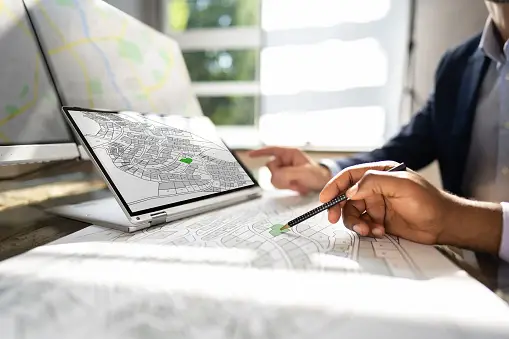Explore concise geography courses offered by leading Institutions globally and access exciting career opportunities in this field of study which harmonizes the earth and humanity.
- Understand topography and why physical features like soil, water, and the climate are where they are and why.
- Explore locations, spatial patterns, places and spatial interactions. Develop critical and analytical thinking ability to present research and findings professionally.
- Study lands phenomena, inhabitants and features; draw and design inclusive representations of the features through maps and geographic information systems.
- Explore physical earth surface properties and human communities around them by analyzing available data and interpreting it suitably.
Top Marketable Careers for Geography Course Graduates

Landscaper
Landscapers construct and maintain buildings, parks, gardens and outdoor spaces. They also consider the functionality of the spaces and use the data to decide on grass, trees, flowers and decorative pieces that will complement a space. They will have basic knowledge of pest control

Architect
Architects research, plan, develop and actualize structural designs of buildings. They will deduce feasibility reports, investigate the environmental impact, draw project proposals, run estimate costs, set timelines and roll out construction projects. To build apartment complexes and malls, an architect will be multidimensional in thinking. Draw 2D and 3D images considering aesthetic value and functionalities.
Architects will be in the office meeting clients, drafting plans and acquiring the relevant construction licenses from government agencies to be able to work. They will liaise with their clients and contractors and guide contractors on reliable suppliers. Architects will resolve issues arising during a project that touches on designs, they will modify project plans to accommodate clients’ needs. Architects will be creative.

Geographer
Geographers study the earth; the distribution of its land, people and features. They also study cultural and administrative structures, the geographical and physical signatures of locations from local to global levels. They will collect geographical data from census drives, surveys, maps, satellite pictures and photographs. They will also research, hold interviews and focus groups to gather data.
Geographers will create visual representations of collected data as well as draw maps. They will investigate the distribution of cultural and physical occurrences and characteristics from the data. They will analyze and display the data using geographical information systems (GIS) or global positioning systems (GPS) for accurate representation. Geographers will work in the education sector as teachers, private companies and even government agencies.

Drafter
Drafters work with architects and engineers to fine-tune a projects structural design and requirements. They calculate material requirements, dimensions of the project and structural weight logistics. Drafters break down the processes of production step by step capturing all hardware and software to be used.
Drafters create the correct project model in computer-aided design software (CAD). They will keep customer communications and be in touch with their needs. They will revise project models based on the customer needs and advise accordingly. They will allocate project guidelines and enforce timelines. Drafters will work for civil projects, government projects nonprofit organizations and individuals.

Environmental Lawyer
An environmental lawyer will lead the preservation and conservation of the environment on the legal, judicial front. They will challenge laws that work against the environment and champion for change and enactment of balanced ad better laws. They will ensure that organizations follow laid out environmental policies.
Environmental lawyers will investigate and question weak environmental policies, they will advise clients on appropriate legislation. They provide expert testimonies in environmental cases, they will work for public and private firms, government agencies, nonprofit companies etc.

Surveyor and Mapper
Surveyors and Mappers are licensed to take accurate measurements while determining property boundaries. They avail required data relevantly applicable to the shape, location, contour, gravitation, dimension and elevation pf land. They will also avail data on the features of the land on or close to the surface of the earth for purposes of mapping, mining, land evaluation, engineering and construction.
Surveyors and mappers apply approved principles and practices of land surveying; they also apply surveying tools like electronic distance measuring equipment. They will verify the data collected from surveys for accuracy highlighting measurements and calculations. Surveyors and mappers will work in the private and public sector, government agencies, nonprofit organizations etc.

Urban Planner
Urban Planners compile well-detailed plans and designs for the development of spaces within towns and cities. They are tasked with the management of the ever reducing urban spaces and to develop them in progressive ways that will withstand the never-ending rural-urban migration.
Urban planners will work closely with developers. Public officials and members of the public collect data on sustainable land use in urban centres. They will analyze the feasibility of available data and present conclusions and recommendations to planning officials and commissions for implementation. They will be conversant with zoning and building codes, environmental laws and by-laws. They will work in government agencies and civic organizations.

Cartographer
Cartographers generate maps and are part of the larger mapping scientists cluster. They will collect geographic data from aerial and ground photography, surveys and research and will use this data to create maps, drawings and charts covering expansive areas of the earth’s surface. They will verify the accuracy of the maps and present them for use to commercial customers and the public sector.
Cartographers will today be knowledgeable in technology as mapping has been computerized with geographical information systems (GIS) packages and remote sensing methodologies. They will now collect, store and transfer data electronically. Maps are also designed, created and produced using computers. Cartographers will work for government organizations, private companies, private consultancies, commercial map publishers and service agencies.

Climatologist
Climatologists study the atmosphere to gain information about the earth’s climate. They collect and analyze samples from the soil, ice, water. rain, air and vegetation to investigate weather patterns and their effects on the earth. They will analyze precipitation, soil moisture and temperatures. They will use data from this research to inform on weather changes, a thorough analysis of the data collected will advise on long term weather predictions.
Climatologists will be highly analytical and with excellent communication skills to enable the presentation of geographical findings in graphic electronic form. They will contribute to research by publishing results of original research in high quality, peer-reviewed scientific journals. They will work in government agencies, private and public sectors, educational and environmental institutions.

Transportation Planner
Transportation planners research, collect data and analyze data to support initiatives on transportation planning. They recommend system upgrades informed by the populace, implications on economies and lifestyles, available space/ land and traffic projections. They advise stakeholders on public policy matters affecting transportation. They take part in public forums that discuss transportation where they present proposals and gather feedback from affected parties.
Transportation planners will lead local transportation conflict resolutions; they will advise the public on transportation issues through specialized targeted events. They will analyze and interpret transportation data presented by multi-sectoral agencies. They evaluate transportation projects budgetary viability and review infrastructural plans making changes where applicable. Transportation planners will work across government and private agencies.
Need help with finding a top geography course?
Get a call backNeed help in deciding the best Bachelors in Geography or Masters course for yourself?
Check out the list of most popular questions around Geography programs
What is Geography?
The is the study of land, features and inhabitants of the earth’s surface. It can also be defined as the study of places and relationships between people and their environments.
What subjects are required to pursue Geography?
At least a Mathematics or a science subject are required for higher level. English, mathematics and one science is necessary at high school level.
These requirements depend on the specific university and course you would like to apply for, which Craydel expert admission counsellors can guide you through.
How many years do you study a Geography degree?
On average, a bachelor’s degree in the geography field will take at least 3 to 4 years. Availability of a placement program will take an extra 6 to 12 months if available. Postgraduate programs will take 12 – 36 months to be achieved.
What are the best courses for Geography?
The field of geography is broad and so if you do not have an inclination towards any specific specialisation, the most popular geography course at a bachelors level, is a Bachelor of Science (BSc) in Geography. This is because this course give students an overview of the different specialisations within the industry.
However, depending on your specific interests and the demand for specilised knowledge and skills in your region, there are also speicalised courses you can take in Cultural Geography, Hydrology and Water Resources Management, Physical Geography and Environmental Geosciences, or Ecosystem Science, for example.
What are the different careers in Geography?
A career in geography is bound to be exciting for individuals passionate about the earth, the environment and sustainability. There are several different fields that you can specialise in with a Geography degree; some of which include Urban Planning, Geospatial Analysis, Cartography, Geomorphology, and Climatology.
For an indepth look into some of the most popular and in demand specialisations, check out our Top Marketable Careers for Geography Graduates section above.

 +254 799 000 444
+254 799 000 444

